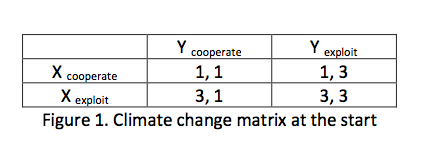Climate Change in the Context of Game Theory
Climate change is a major catastrophe that is looming on the horizon carrying many far reaching and complex consequences. Despite the immense sense there seems to be in the global community working towards abatement of greenhouse gas emissions and securing our future there has yet to be substantial steps in that direction. The article compared this situation to that of nuclear disarmament and mutually assured destruction. Even when the apparent best solution would be for both parties to disarm their nuclear weapons, tensions rose and new technology developed as the risk of one party disarming to have the other party not disarm was too great, and the benefit of not disarming to having the other party disarm would outweigh the benefits of both parties disarming. This type of situation is called the prisoner’s dilemma in game theory. The same concept outlines climate change as policies pertaining to it would greatly affect the economies of individual countries and the world.
The article focused on creating a game-theory based understanding of climate change policy to better understand how countries could implement policies and for what purpose. At first the article viewed climate change policies and agreements between countries within the prisoner’s dilemma, however, it may be more complicated than that. There exists something called a “sweet spot” where one party may agree to undertake climate change policies while the other party encourages it while not undertaking policies themselves. This is because of the uncertainty of the costs and benefits of reduction and different states have different points at which the value of reduction overcomes the value of keeping pollution as is.
The article uses West Virginia and Kentucky as an example as they are leading figures in per capita greenhouse emissions. They’re a good example of a short-term assessment of climate change policy in which there is no immediate threat to the environment. In this case the costs of implementing policies would outweigh the benefits of protecting the environment. West Virginia and Kentucky both do not have an incentive to cut down on greenhouse emissions especially as they compete economically. This can be depicted in the following chart:

However, the scenario may morph into that of a “stag hunt” as the environment nears collapse. At that point it will become increasingly apparent, the dominant strategy, for all parties to cooperate as the cost of climate change becomes immense.

The main goal is for the situation of climate change to be turned into a stag hunt before it is much too late to protect our environment.
Taking the concept of game theory which we learned in lecture and applying it to a prevalent and increasingly alarming issue such as climate change was an interesting proposition. The research and specifics of this interpretation of climate change is still being conducted in The Atlantic. However, it offers insight into how policies should be formulated and towards what goal. The payoff of mitigating emissions must be increased while the cost of mitigation must be decreased, it is also equally important to increase the education and understanding of the consequences that climate change brings.
Link: https://www.theatlantic.com/notes/2016/04/game-theory-climate-change/476517/
